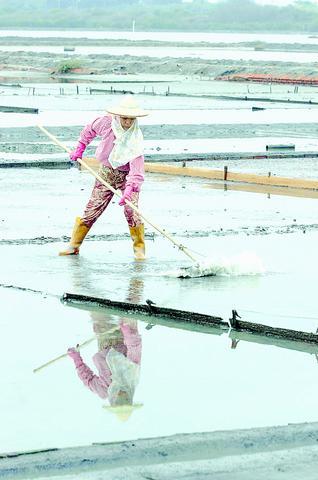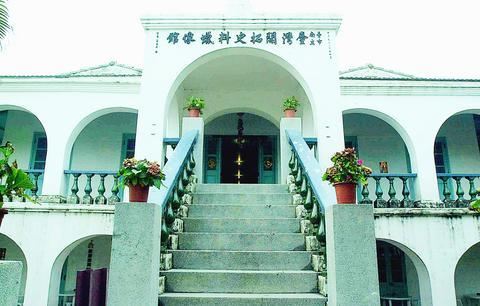The vast fields and adjoining buildings were once the center of one of Taiwan's most important industries -- making salt. With the decline of the industry they were left derelict, subject to the ravages of time and weather.
But now, with support from the Tainan City Government and the national Council for Cultural Affairs the plantation will be restored as the Salt Field Ecology and Cultural Village as part of a plan to revitalizing both the industry and the city.

PHOTO: CHIANG YING-YING, TAIPEI TIMES
The salt fields in Tainan span the old port areas between An-nan (

PHOTO: CHIANG YING-YING, TAIPEI TIMES
The salt-field operations started in 1919 during the Japanese occupation of Taiwan. At the time, the salt production was monopolized. But as the modern electrolysis salt-making technology replaced the traditional salt works, the operation was halted in 1994 and the vast fields with their production facilities were abandoned.
The Salt Field Ecology and Cultural Village plans to use these assets to turn itself into a tourism spot by exhibiting the cultural, historical, industrial and natural resources of the area.
Chairwoman of the Council for Cultural Affairs Tchen Yu-chiou (
"Every concept of these policies is realized in Tainan's Salt-Field Ecology and Cultural Village," Tchen said.
The village, defined as a local culture center, gets its funding from the council's budget for repairs of buildings at county and municipal culture centers.
Tchen also lauded the abundant natural resources surrounding the salt-fields, the 500-hectare Szu-tsao Wildlife Protection Zone (
Tainan City Mayor Hsu Tien-tsai (
Among the various resources to be restored, the salt-making equipment and installations are considered the priorities.
These facilities include the waterway transportation facilities such as the canal, port, dock and raft, as well as the machinery at the water-pumping station.
Living museum
The old warehouse at the dock is to be renovated into a museum to display the salt-making tools and other machinery which depicts the heyday of the salt-field operation.
The square-shaped salt pans, which are hung on racks to employ wind evaporation, will also be put back into operation.
Those running the center believe that keeping the facilities in use is the best way to maintain the wood and clay-brick buildings which would fall apart without proper care.
However, not every inch of the salt fields will be put back into operation, since it would not be economical to employ the labor-intensive practices that would be necessary for the the mass production of salt in this way
But the resumption of work on a limited scale is aimed at sustaining and maintaining the culture, history and traditions of the industry and educating people about them.
In addition to the 50-hectare salt plantation, the village includes a 16-hectare bird habitat area.
Tainan City Deputy Mayor Hsu Yang-ming (
Hsu said the salt itself will be a key attractions for tourists who come to learn the process of making salt.
"We will make it a three to four-day package tour for tourists who can come to stay in the village during the weekends to learn about salt-making, and at the same time watch the numerous birds that inhabit the the salt marshes," Hsu said.
On the site visitors will use the traditional tools such as water wheels, windmills, rakes, bamboo baskets and cross-shoulder carrying poles.
In addition to experiencing the salters' life, other features of the village also include the making of handicrafts such as bamboo nests, silk scarves, and woodblock printing mastered by the salt-field villagers who utilize the existing materials to make the handicrafts.
An important part of the history of the salt-fields operation are the generations of salt workers who lived and worked there.
But nine years ago when the salt-operation was called off, the villagers started to switch to other vocations and other locations.
Roots
The salt-field terrain is 30cm below sea level -- which led to constant flooding of their traditional dwellings in the middle of the salt fields. At the end of last year, all of the villagers who used to live in the central island of the salt-fields were evacuated to the neighboring community.
Nevertheless, the villagers finally went back to their roots in the salt fields when they were informed that the government was to revitalize the operations.
"These villagers are very spontaneous and zealous about being able to come back to their family land to carry out their ancestors' business," Hsu said.
"The speed with which they demolished their old buildings surprised us. They are very efficient in doing what we told them to do, as they have a special connection with this land that makes them so devoted," Hsu said.
The repair work for the construction of the Salt Field Ecology and Cultural Village will require a NT$12 million budget.
"The villagers started the preparation work long before the budget arrived. They just can't wait to see their homeland begin to prosper again," Hsu said.
In addition, several bird watching pavilions have been built with the driftwood found on the beach.
"They use the materials on the beach for building. In that way, they also help keep the beach clean," Hsu said.
Currently, the salt-fields are in the care of both the city government and private organizations which involve historical scholars and environmentalists to preserve the cultural and natural assets.
The construction of the village is scheduled to be completed by the end of next year. During the salt-making season, which spans from October to April, the village is to be open fully. During the off-season, visitors must make an appointment if they wish to tour the facilities.

Global bodies should stop excluding Taiwan for political reasons, President William Lai (賴清德) told Pope Francis in a letter, adding that he agrees war has no winners. The Vatican is one of only 12 countries to retain formal diplomatic ties with Taiwan, and Taipei has watched with concern efforts by Beijing and the Holy See to improve ties. In October, the Vatican and China extended an accord on the appointment of Catholic bishops in China for four years, pointing to a new level of trust between the two parties. Lai, writing to the pope in response to the pontiff’s message on Jan. 1’s

A Vietnamese migrant worker on Thursday won the NT$12 million (US$383,590) jackpot on a scratch-off lottery ticket she bought from a lottery shop in Changhua County’s Puyan Township (埔鹽), Taiwan Lottery Co said yesterday. The lottery winner, who is in her 30s and married, said she would continue to work in Taiwan and send her winnings to her family in Vietnam to improve their life. More Taiwanese and migrant workers have flocked to the lottery shop on Sec 2 of Jhangshuei Road (彰水路) to share in the luck. The shop owner, surnamed Chen (陳), said that his shop has been open for just

TAKE BREAKS: A woman developed cystitis by refusing to get up to use the bathroom while playing mahjong for fear of disturbing her winning streak, a doctor said People should stand up and move around often while traveling or playing mahjong during the Lunar New Year holiday, as prolonged sitting can lead to cystitis or hemorrhoids, doctors said. Yuan’s General Hospital urologist Lee Tsung-hsi (李宗熹) said that he treated a 63-year-old woman surnamed Chao (趙) who had been sitting motionless and holding off going to the bathroom, increasing her risk of bladder infection. Chao would drink beverages and not urinate for several hours while playing mahjong with friends and family, especially when she was on a winning streak, afraid that using the bathroom would ruin her luck, he said. She had

MUST REMAIN FREE: A Chinese takeover of Taiwan would lead to a global conflict, and if the nation blows up, the world’s factories would fall in a week, a minister said Taiwan is like Prague in 1938 facing Adolf Hitler; only if Taiwan remains free and democratic would the world be safe, Deputy Minister of Foreign Affairs Francois Wu (吳志中) said in an interview with Italian newspaper Corriere della Sera. The ministry on Saturday said Corriere della Sera is one of Italy’s oldest and most read newspapers, frequently covers European economic and political issues, and that Wu agreed to an interview with the paper’s senior political analyst Massimo Franco in Taipei on Jan. 3. The interview was published on Jan. 26 with the title “Taiwan like Prague in 1938 with Hitler,” the ministry